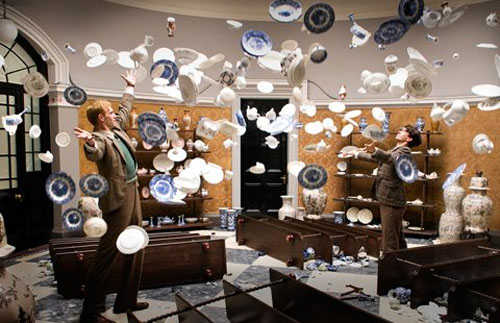Fantastic Fest Review: Cloud Atlas

"Scene. Scene. Scene. Scene. WTF?"
Those are the notes I took in the first 5 or 10 minutes of Cloud Atlas, the latest movie from Tom Tykwer, Andy Wachowski and Lana Wachowski, which was the Wednesday night secret screening at Fantastic Fest. I felt like every time I blinked, the movie shifted to another scene in another setting that I didn't quite understand.
But the scenes grew longer, and I was swept away by the multitude of stories taking place at various points in time, all illustrating the same themes. I stopped taking notes and stopped wondering if I was lost because I hadn't read the David Mitchell novel from which the movie was adapted. I surfaced more than two hours later, completely dazzled. And whether I can explain why to you -- we'll see.
Cloud Atlas incorporates six stories from different times in the past, present and future. The stories are simple but compelling: A mid-nineteenth century man on a voyage, suffering from a mysterious ailment. An aspiring composer in the early twentieth century, writing letters to the man he loves, from whom he is separated. An investigative reporter in 1973 who may have landed her most serious (and dangerous) scoop. A contemporary literary agent trying to get back on his feet. A rebellious clone retelling her story while in prison. A man in a primitive post-apocalyptic land visited by a woman from a more advanced society.
The actors play different characters in each story (not every actor is in every story, but a few are). The idea is to show the interconnectedness between the stories not just through their themes but through the actors. For example, Tom Hanks appears as not only the lead in the post-apocalyptic world, but also a scientist, a possibly shady physician, a hotel clerk, and a hot-headed British author. Halle Berry plays a journalist, a futuristic explorer, a sexy trophy wife and I suspect at least one other role I can't remember in which she was likely unrecognizable. Hugo Weaving, Jim Sturgess, Jim Broadbent, Susan Sarandon, Hugh Grant and Keith David also have multiple roles, one often very different from another -- the lead in one story may have a quick walk-on in another.
This casting is a daring move that could have come off as gimmicky, especially because the actors sometimes portray characters from ethnic backgrounds, races and even genders that are not their own. It can feel a little creepy at times -- the "yellow face" makeup in particular -- but the tactic works because it's in service of a larger story. Also, it could easily have devolved into a game of "Let's find Hugo Weaving," but with only a few exceptions (if Weaving is going to play a woman, it's a shame not to show off his legs), the casting worked and in fact added to the strength of some of the stories.
The stories that comprise Cloud Atlas don't sound like much on paper, but the performances and their interconnectedness with the other stories gives them emotional impact. The editing is key here, as is the score from co-filmmaker Tom Tykwer, Reinhold Heil and Johnny Klimek (who also all collaborated on the Perfume score). The score even fits in with the storyline in a way.
It doesn't always work. Susan Sarandon is an excellent actress and I enjoy watching her, but somehow she seems so much like a contemporary woman -- and her own self -- that when she's a prim 19th-century wife or a primitive shaman, she isn't believable. The language in the post-apocalyptic world is difficult to understand -- bordering on annoying -- and therefore it takes longer to feel involved in the story.
But the fact is that Cloud Atlas picked me up and shook me and then dumped me back in my theater seat, profoundly affected (even with a bad cold) and emotionally overwhelmed. Not many movies do that. I tend to fidget in movies over two hours long; this one ran 164 minutes and I barely moved. The movie will open in Austin on October 26 -- see it and find out if it will do the same thing to you.

